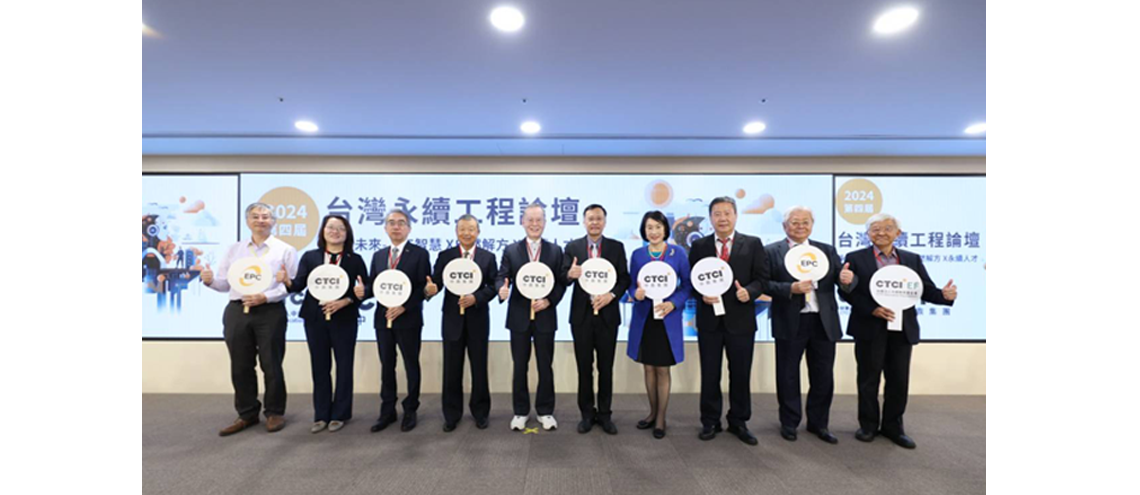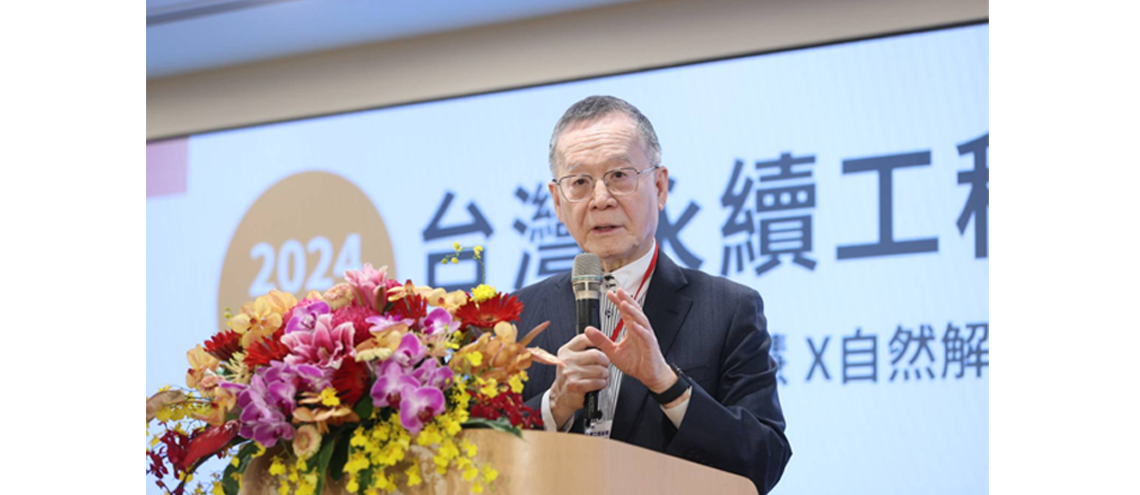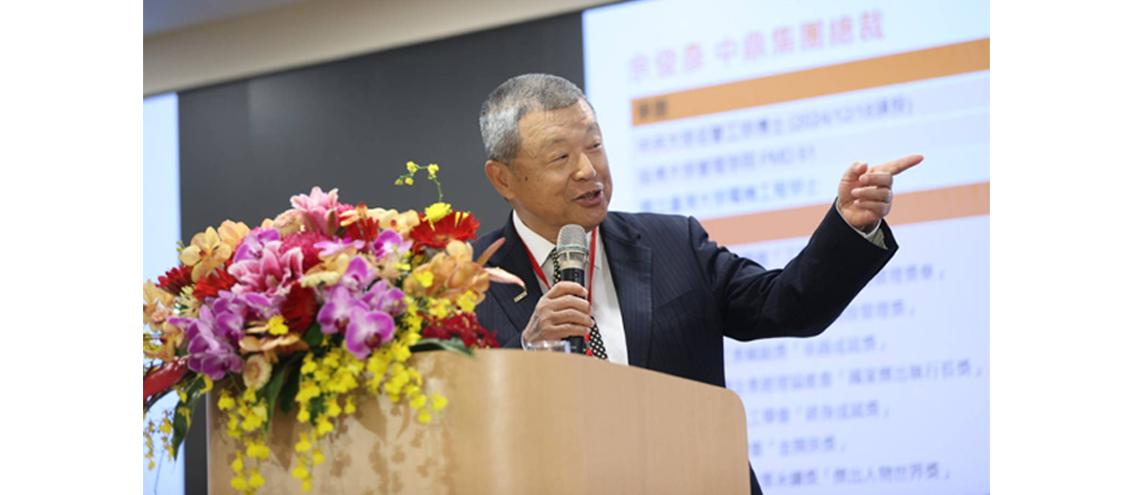CTCIEF
中鼎教育基金會
The Fourth Taiwan Sustainable Engineering Symposium: Towards a Future of Sustainable Engineering through Green and Smart Transformation
In December 2024, CTCI Group and the CTCI Education Foundation (CTCIEF) co-hosted the 4th Taiwan Sustainable Engineering Symposium. With a theme of “Sustainable Future: AI × Nature-Based Solutions × Sustainable Talent,” the event drew over 200 professionals from diverse industries. Through three breakout sessions, participants engaged in deep dialogues from multiple perspectives to identify innovative solutions and lay the groundwork for future cross-sector collaboration.
Eugene Chien, Chairman of CTCIEF, stated that CTCI Group plays the role of “Guardian of Sustainable Earth” by leveraging its core engineering strengths and proactively aligning its own actions with global standards. After being officially admitted to the United Nations Framework Convention on Climate Change (UNFCCC) as an observer member last year, CTCIEF has gained first-hand global insights through actively participation in the Conference of the Parties (COP) for two consecutive years. Young Ku, CEO of the Taiwan Institute for Sustainable Energy (TAISE), noted that despite significant differences among COP member states on various issues, there was a mutual respect and constructive negotiation, fostering more climate action mechanisms to drive transformation.
Harnessing AI to Pass Down Expertise
In the AI session, CTCI Group’s Chief Innovation Officer Chin-Yuan Chiu introduced three major AI-driven initiatives: AI-enabled design tools, engineering expert systems, and smart factory control. Mr. Joe-An Chou, Chief Engineer at Sinotech Engineering Consultant, LTD., highlighted how the company leverages AI to develop an online learning platform and streamline the construction design review process. Meanwhile, CECI Engineering Consultants shared its experience using AI to analyze high-resolution satellite and drone imagery for model construction and quality inspections.
However, Dalton Lin, Secretary General of the CTCI Education Foundation, pointed out that AI technologies still face challenges such as limited data availability, technical integration difficulties, and skill gaps among users. He emphasized that effective AI adoption must incorporate knowledge transfer and sustainable design thinking to enhance both applicability and efficiency.
Balancing Ecology and Human Welfare
In the Nature-Based Solutions session, Professor Shin-Cheng Yeh from National Taiwan Normal University highlighted that, according to the International Union for Conservation of Nature (IUCN), engineering practices should minimize ecological impact. Professor Ling‑Ling Lee at the Institute of Ecology and Evolutionary Biology, National Taiwan University added that nature-based solutions go beyond conservation; they must address ESG challenges while enhancing human well-being, biodiversity, ecosystem services, and resilience. Stephen Fang, Project Manager for Biodiversity at CTCI Group’s Sustainability & Net Zero Office, shared practical experience in applying the TNFD framework to assess dependencies and impacts on natural capital, and how these insights are integrated into core business biodiversity initiatives.
Cultivating Sustainable Talent through Industry–Academia Collaboration
In the “Sustainable Talent” session, Yung‑Shuen Shen, Secretary General of TAISE, emphasized that skilled talent is at the core of sustainable development. He noted that green skills go beyond industry‑specific techniques to include interdisciplinary competencies, such as sustainability reporting, environmental impact assessment, and regulatory compliance, as well as other soft skills, for example, environmental literacy, innovation, and problem‑solving. He suggested that companies should develop a professional competency framework and a curriculum roadmap for sustainable talent, incentivize further training with promotion pathways, establish industry–academia partnerships with universities, and create attractive workplace environments to retain talent.
Joanne Ho, Chief Sustainability Officer of CTCI Group, shared insights on emerging trends in sustainability talent and elaborated on how the new generation of green professionals can be cultivated to foster resilience and innovation.
Dr. Man-Chun Liu, Deputy Executive Director of the Chinese Institute of Engineering Education, introduced how international certifications can be leveraged to develop talents equipped with sustainability knowledge and capabilities.
From Guardian to Wave‑Maker: CTCI Focuses on Steady Growth through Green Engineering
As CTCI Group Chairman John T. Yu observed, as sustainability and AI draw world attention, potential opportunities abound. AI‑driven plant engineering, green energy, combined-cycle power plants, LNG storage and transportation, waste recovery, smart operations centers, or technologies such as blue hydrogen, carbon capture, sustainable aviation fuel, and seawater desalination, these all represent potential opportunities riding the green wave. Over the past years, CTCI Group has actively invested in green and digital engineering transformation, achieving steady year‑on‑year growth.
Moreover, CTCI not only pursues its own sustainability goals but also advocates collective progress. On the one hand, it is developing low‑carbon supply chains and building suppliers’ carbon‑management capabilities. On the other hand, it has provided public access to its internal professional courses through the free online platform CTCI Learning, with the goal of enhancing the overall technical knowledge level across the engineering sector. To drive corporate sustainability momentum and improve overall ESG performance, CTCI commissioned external scholars and experts to develop its ESG program, analyzing global trends and peer practices, and devising mid‑ to long‑term net‑zero and sustainability governance strategies.
Professor Emeritus Pen‑Chi Chiang from the National Taiwan University’s Graduate Institute of Environmental Engineering, who led the initiative, stated that the global net‑zero transition presents both challenges and opportunities for CTCI. By expanding international partnerships and actively engaging in global initiatives and organizations, CTCI can demonstrate industry leadership, enhance its brand image, and elevate its social impact and international visibility.
Looking ahead, CTCI pledges to work closely with the government, industry, and academia to contribute its expertise and strength toward sustainable development in Taiwan and globally.





